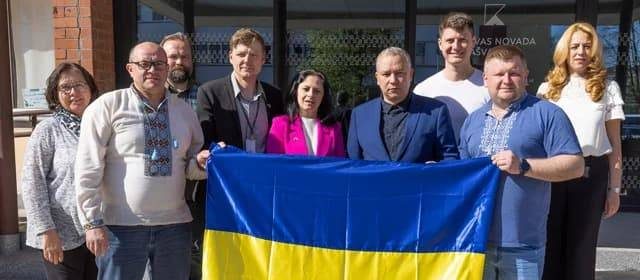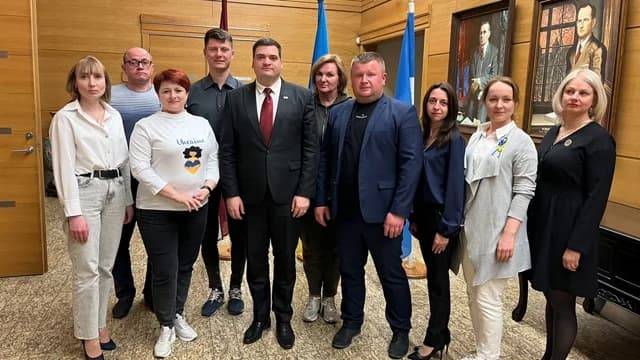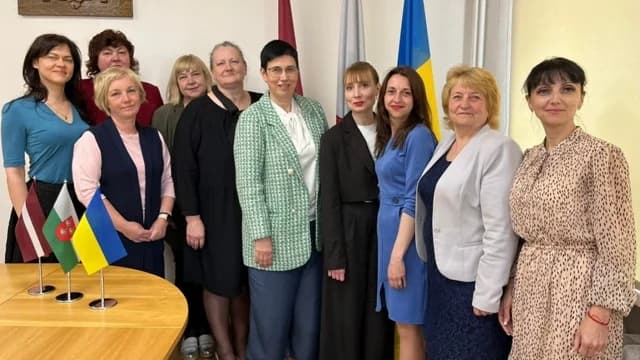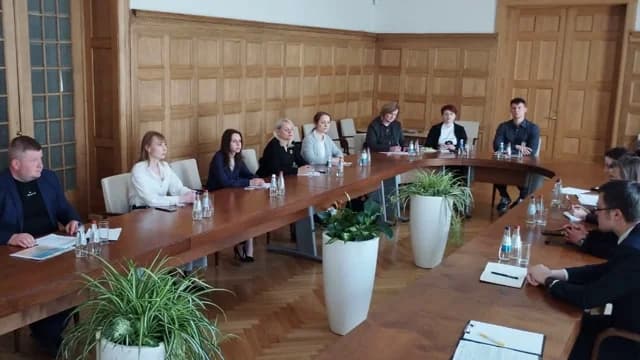
Representatives of Chernihiv region communities gain experience in atvia
A delegation of two communities from the Chernihiv region has returned from a study visit to Latvia.
It was the next stage of bilateral talks that took place at the end of march as part of the project “promoting comprehensive community development through analysis, dialogue and international cooperation” funded by the deutsche gesellschaft für internationale zusammenarbeit (giz) in support of the decentralisation reform in ukraine (u-lead with europe. Phase ii). At that moment, the leaders of the ukrainian and latvian municipalities agreed to cooperate: koropska community will cooperate with gulbene, latvia, and novyi bilous – with the city of kekava.
The visit was organised by the Association of Ukrainian Cities (AUC), the Council of European Municipalities and Regions (CEMR) and the Latvian Association of Local and Regional Governments (LALRG) with the support of the Ministry of Foreign Affairs of the Republic of Latvia.
The study visit began with the Latvian-Ukrainian Local Solidarity Forum “Before…”, which explored the possibilities of Latvian and Ukrainian municipal cooperation under EU programmes.
On 8 May, representatives of the communities met with Ambassador Extraordinary and Plenipotentiary of Ukraine to the Republic of Latvia Anatoliy Kutsevol and First Secretary of the Embassy of Ukraine Leonid Grebennyk to discuss restoring Ukrainian communities.
On Europe Day, 9 May, they held a partnership meeting with the leaders of the Latvian Association of Local and Regional Governments (LALRG) and got information on the work of LALRG and the Latvian local government system. In particular, they discussed best practices in solid waste management that could be successfully applied in Ukraine.
In a meeting with their counterparts from Riga City Council, the Ukrainian local government representatives learned about digital solutions for local government and sustainable energy solutions for developing a smart city and presented their municipalities.
On 10-11 May, representatives of Ukrainian communities visited their Latvian counterparts in Gulbene and Kekava, exchanged their experiences and discussed work on joint projects for further cooperation in the restoration and development of Ukrainian territorial communities.
Yulia Prokhorenko, Head of the Economy, Investment and Innovative Development Department of Korop Village Council, and Yulia Solodka, Head of the Finance Department, began their visit to Gulbenė with a meeting with Deputy Mayor Guna Švika and heads of municipal departments at Gulbenė City Council. The Latvian colleagues were keen to share their experience of attracting international funding and implementing successful projects. The parties agreed to work on joint projects and to seek grants and funding for their implementation.
The Deputy Mayor suggested that a Memorandum of Understanding between Gulbene City Council and Korop Village Council be signed soon to further the cooperation.
The areas of cooperation identified by Korop and Gulbene include:
- attracting investment in the production of wood-based building materials;
- purchase of municipal machinery (special vehicles);
- construction, repair of water supply/wastewater infrastructure;
- solid waste management (separate collection and sorting of solid waste), social sphere, tourism, cooperation with business
Representatives of Koropska Community visited construction, wood and metal processing enterprises and learned about the city’s water de-ironing system. They paid special attention to the functioning of social services in Latvia and the system of providing social services to the municipality’s residents. They also visited the Social Agency of Gulbene Municipality, the Day Care Centre for People with Disabilities and the Social Assistance Centre. Visits to the Railway and Steam Educational and Interactive Centre were useful, as was learning about the development of the tourism sector and the preservation of the cultural heritage of Gulbene Municipality.
“By visiting Gulbene Municipality, we studied the experience of our European partners in the areas of our interest and identified the priority areas to be worked on in the municipality in the near future. We are sincerely grateful to the Project for the opportunity to visit Latvian municipalities and learn from the unique experience of our colleagues to use the knowledge gained for the development of our native community” .
Yulia Prokhorenko
“We are grateful to the Project for the opportunity to establish cooperation with European partners, especially in the current conditions in Ukraine. The experience gained during the visit to Latvia is significant and will be used in the future for the development of our community”.
Yulia Solodka
Dmytro Fedorov, head of Novyi Bilous Village Council, and his deputy Anatoliy Krugol continued their study visit to Kekava municipality.
They met with Andris Vitols, the First Deputy Mayor of Kekava, and heads and specialists of municipal departments.
Areas of cooperation between the municipalities of Novyi Bilous and Kekava include:
- restoration of the destroyed communal and residential infrastructure;
- construction of bomb shelters in educational institutions;
- purchase of municipal equipment and school buses;
- exchange of experience in establishing the educational process, optimising the water supply/wastewater disposal network, introducing renewable energy sources, and saving energy.
The Ukrainian delegation visited the Baloži Secondary School to learn about the organisation of the educational process and the energy efficiency solutions implemented in the school. They visited municipal enterprises to learn about the water supply system and the use of renewable energy sources. The delegation also studied the work of the regional municipal police and its logistics.
Representatives of Kekava Municipality presented three projects implemented with the support of the EU Investment Fund – the Day Care Centre on Gaismas Street in Kekava, which will provide social care and social rehabilitation services, and the energy efficiency projects of Leviņa pre-school educational institution in the Baldones Municipality building. The Novyi Bilous representatives also learned about using renewable resources for local heating in Baldones, visiting the centre for housing Ukrainian war refugees in Baldones and the Centre for New Ideas in Kekava.
Dmytro Fedorov, head of the Novyi Bilous Village Council, said:
“We are a small municipality operating in its current composition for only three years. As part of the Project, we visited Latvia to learn Kekava municipality’s experience and apply its best practices in Novyi Bilous. By the time Ukraine joins the EU, our municipality wants to be ready to use all the opportunities offered by the European Union to restore and develop the municipality of Novyi Bilous”.
Preparing joint projects between the Latvian and Ukrainian communities will be the next step in friendly international cooperation.
Media, Publications
-
Deputy Ambassador of the EU on enlargement, reforms and €190 billion in support
-
EU membership in 2030? Deputy Ambassador of the EU answers students’ questions
-
How does the EU take decisions on Ukraine? Subsidiarity, unanimity and consensus among 27 countries
-
What reforms does Ukraine still need to join the EU? Deputy Ambassador of the EU answers
-
How can Ukrainian students become more involved in EU programmes and projects? Deputy Head of the EU Delegation answers
-
Are there alternatives to European integration if the road to the EU is long? Deputy Ambassador of the EU answers




